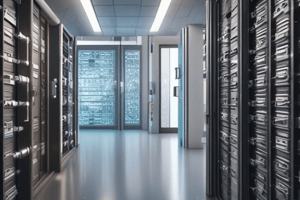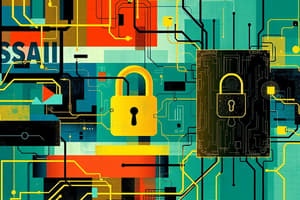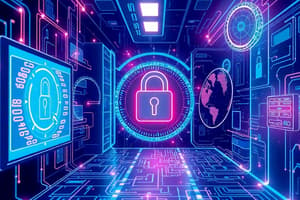Podcast
Questions and Answers
What is the primary purpose of monitoring in information systems security?
What is the primary purpose of monitoring in information systems security?
- To hold subjects accountable for their actions and detect unauthorized or abnormal activities (correct)
- To grant or restrict access to hardware, software, and organizational policies
- To collect a large volume of data for analysis and reconstruction of events
- To identify users attempting to access the system
What does access control in information systems security involve?
What does access control in information systems security involve?
- Enabling sufficient logging and auditing to monitor a system
- Collecting log files to detect problems and reconstruct events
- Granting or restricting access, monitoring and recording attempts to access, and determining whether access is authorized (correct)
- Detecting malicious actions by subjects and attempted intrusions
What is the purpose of using log files in monitoring a system?
What is the purpose of using log files in monitoring a system?
- To collect a large volume of data for analysis of system failures
- To provide evidence for prosecution and produce problem reports
- To enable sufficient logging and auditing to monitor the system
- To detect problems and reconstruct events (correct)
What happens when sufficient logging and auditing are enabled to monitor a system?
What happens when sufficient logging and auditing are enabled to monitor a system?
What are the benefits of monitoring in information systems security?
What are the benefits of monitoring in information systems security?
What is a significant reason why ethics in business is becoming more important?
What is a significant reason why ethics in business is becoming more important?
Which of the following is NOT mentioned as an issue in computer ethics?
Which of the following is NOT mentioned as an issue in computer ethics?
Which ethical concern is associated with unsolicited emails?
Which ethical concern is associated with unsolicited emails?
How do ethics differ from laws according to the provided content?
How do ethics differ from laws according to the provided content?
What is one potential consequence of using peer-to-peer networks for music downloads?
What is one potential consequence of using peer-to-peer networks for music downloads?
According to Socrates, what is the main factor that leads individuals to commit evil actions?
According to Socrates, what is the main factor that leads individuals to commit evil actions?
What is a characteristic of situational ethics as proposed by Joseph Fletcher?
What is a characteristic of situational ethics as proposed by Joseph Fletcher?
Which of the following is considered a virtue according to the discussion on personal ethics?
Which of the following is considered a virtue according to the discussion on personal ethics?
Which of the following describes the concept of integrity as per the content?
Which of the following describes the concept of integrity as per the content?
What distinction is made regarding moral codes in different societies?
What distinction is made regarding moral codes in different societies?
Flashcards are hidden until you start studying
Study Notes
- Access control: Any security measure that grants or restricts access to systems or information, monitors and records attempts, identifies users, and determines authorization.
- Monitoring: Process of holding accountable authenticated users for their actions, detecting unauthorized or abnormal activity, and reconstructing events for evidence and analysis.
- Intrusion Detection: Part of monitoring, process of identifying and responding to unauthorized access or system intrusion.
- Penetration Testing: Proactive testing of systems to identify vulnerabilities and potential attacks.
- Log Files: Useful for monitoring, but can result in overwhelming amounts of data, making it difficult to identify important details.
General Ethics
- Ethics refers to a set of beliefs concerning right and wrong behavior in society.
- It offers a framework for individuals to navigate moral questions beyond legal obligations.
Business Ethics
- Growing complexity and risks in the corporate environment increase the importance of business ethics.
- Companies aim to protect themselves and their employees from potential legal repercussions associated with unethical actions.
Ethics in Information Technology
- Employers monitor email and Internet access, raising privacy concerns.
- Peer-to-peer networks for music sharing can infringe copyright laws, highlighting issues of intellectual property.
- Unsolicited emails, or spam, are a persistent ethical dilemma in IT.
- Hacking incidents may lead to identity theft, affecting financial institutions and individuals.
- Academic integrity is at stake with students downloading material leading to plagiarism.
- Websites may utilize cookies or spyware to track users, often without their consent.
Computer Ethics
- Computer ethics encompass moral standards for computer use, addressing privacy, intellectual property rights, and societal impacts.
Socratic Ethics
- Knowledge is essential for ethical behavior; ignorance may lead to immoral actions.
- Self-awareness is crucial for success and ethical decision-making.
- Genuine understanding of right and wrong leads to ethical behavior.
Applied Ethics
- Relies on a society’s moral code but can encounter conflicts influenced by personal backgrounds like age, ethnicity, and religion.
- Real-life moral dilemmas include questions about abortion rights, affirmative action, and responsibilities towards animals.
Situational Ethics
- Suggests that moral principles can be altered depending on circumstances, focusing on the outcomes of actions rather than their intrinsic morality.
- This approach emphasizes that the ends can justify the means in certain scenarios.
Personal Ethics
- Personal ethics are shaped by upbringing and life experiences, evolving throughout one's life.
- Virtues promote ethical behavior, including fairness, honesty, and loyalty.
- Vices, such as greed or vanity, represent detrimental qualities, but driven ambition can lead to achievements if aligned with ethical standards.
Integrity
- Integrity involves adhering to one’s personal principles and being accountable for one’s actions.
- Consistency between actions and moral beliefs is imperative for maintaining ethical integrity.
Studying That Suits You
Use AI to generate personalized quizzes and flashcards to suit your learning preferences.





